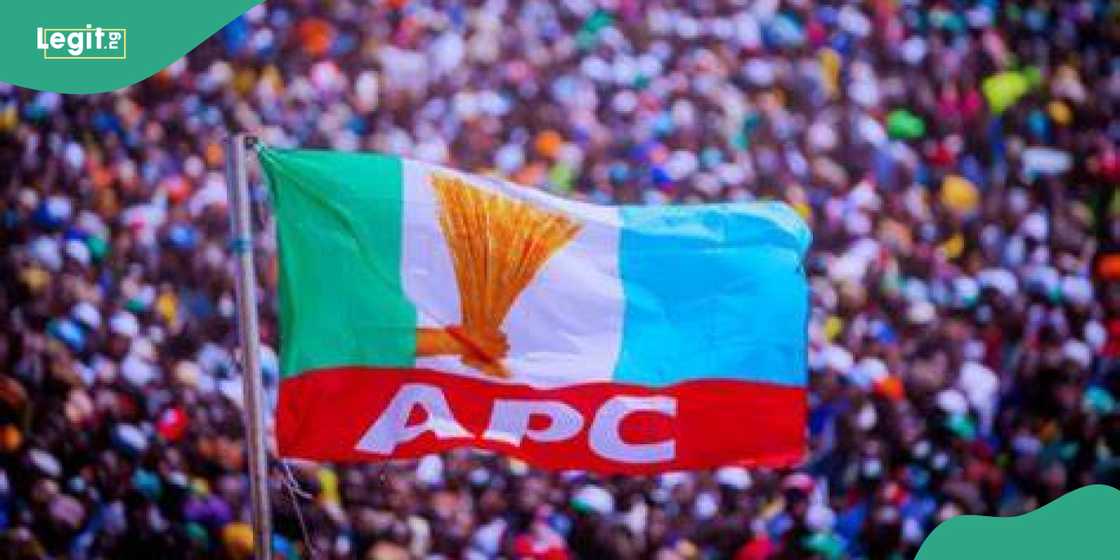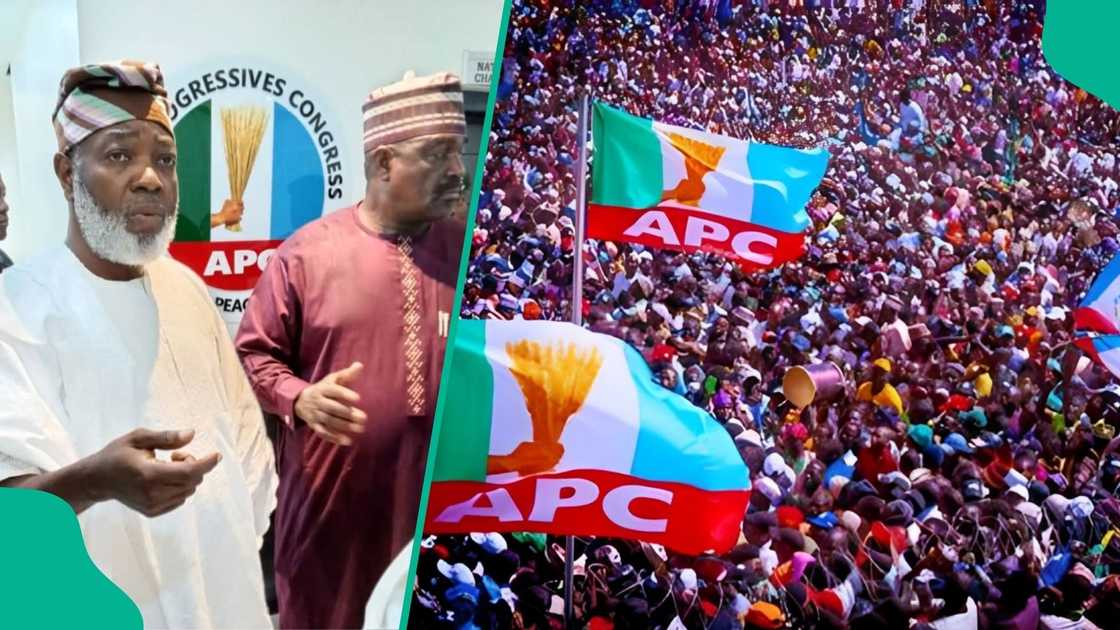In a development that has generated significant attention across Nigeria, the All Progressives Congress (APC) has excluded Engineer Kayode Ojo from participating in the upcoming Ekiti State governorship primary. The move, which has stirred debates among party loyalists and observers, could influence both internal party dynamics and the broader political landscape in the state and region.
The news of Ojo’s disqualification came to light following his visit to the APC state secretariat in Ado-Ekiti on Thursday, October 9, an encounter reportedly marked by a notably cool reception from the party’s leadership. According to accounts, the lack of a warm welcome fueled speculation about his standing within the party well before the announcement was officially confirmed.
Massive Turnout Greets Kayode Ojo in Ado-Ekiti
Prior to the disqualification, Engineer Ojo led an impressive procession of supporters that showcased his popularity across the state. Organisers estimated that thousands of backers, drawn from all 16 local government areas, converged in Ado-Ekiti and accompanied Ojo to the APC headquarters.
The spectacle brought daily business in parts of the city to a standstill as crowds gathered to catch a glimpse of the aspirant, reflectively demonstrating the grassroots strength his campaign has cultivated. According to stakeholders interviewed on site, Ojo’s rally served as both a show of force and a testament to his appeal among ordinary residents.
Details Emerge on Disqualification: What We Know

Source: Twitter
A report from TVC News confirmed that Ojo’s candidature has been disqualified, preventing him from partaking in the governorship primary election. However, as of press time, official reasons for the disqualification remain undisclosed. Party insiders who spoke under condition of anonymity alleged that the disqualification stemmed from perceived “screening irregularities,” possibly related to documentation or other eligibility criteria. Still, without an explicit statement from the party, uncertainty lingers regarding the exact grounds for exclusion.
Political analysts have noted that screening processes in Nigerian political parties, particularly in states like Ekiti, are often contentious and can reflect larger strategic calculations within party hierarchies. Dr. Tunde Lawal, a political scientist at Ekiti State University, explained, “Screening is typically more than just a technical process. It’s about control, bargaining, and managing factional interests ahead of high-stakes contests.”
Official APC Reaction Still Pending, Party Base Reacts
At the time of writing, the APC’s national and state bodies had yet to issue a public statement clarifying Ojo’s disqualification. Nonetheless, the incident has sparked a flurry of reactions on social media and local discussion forums, with many party members and supporters voicing concern about possible divisions within the APC ahead of the elections. According to a report by Nation, several commentators have described the move as “strategic but risky,” with the potential to intensify competition and even provoke defections.
On X (formerly Twitter), prominent party supporter Akinwale Adebayo tweeted, “We can’t afford to sideline credible aspirants; the people’s mandate should not be decided in secret.” Meanwhile, others have urged the APC leadership to foster greater transparency and inclusivity as it heads into a crucial period for party unity and public confidence.
Kayode Ojo Makes His Presence Felt Despite Setback
Despite the political turbulence, Kayode Ojo remained resolute, making a dramatic entry into Ekiti under stringent security measures. He travelled via Akure and Ikere, drawing a sizable contingent of loyalists and notable APC figures. Among those in his entourage were Chief Ropo Adesanya, former House of Assembly lawmaker Hon. Adebayo Morakinyo, Akin Olayisade, as well as former aides to high-profile state figures like ex-Governor Kayode Fayemi and the incumbent, Governor Biodun Oyebanji.
Ojo’s motorcade arrived at the party secretariat around 5 p.m., where he addressed an eager crowd, thanking his supporters for their steadfastness. Even though no State Executive Council members were present to welcome him, the magnitude of the turnout—despite the controversy—was a clear indicator of continuing loyalty among his base. “We remain hopeful for Ekiti’s future. This journey is about the people, not positions,” Ojo told the gathering, as reported by local media.
Defection Rumours Addressed by Ekiti Governor
Amid the political upheaval, another notable development took centre stage when Ekiti State Governor Biodun Oyebanji denied rumours suggesting he, along with other prominent political actors, planned to defect from the APC to the African Democratic Congress (ADC). Oyebanji categorically dismissed the claims as “entirely false and misleading,” attributing their spread to unnamed individuals aiming to destabilise political cohesion in the state. His position was formally communicated in a statement issued by his special adviser on media, Yinka Oyebode, and released through the social media platform X.
“These rumours are the work of those who wish to sow discord within the ranks of party members. Our commitment to the APC, both in Ekiti and nationally, remains unwavering,” Oyebanji affirmed, calling for unity ahead of the 2027 general elections.
The Broader Implications: What It Means for Ekiti and Nigerian Politics
The exclusion of a high-profile aspirant like Kayode Ojo is not just about individual ambition—it also speaks volumes about power dynamics within the APC and the evolving nature of intra-party democracy in Nigeria. With Ekiti often viewed as a barometer for Southwest regional politics, the decisions made here could send ripples through national calculations, especially as Nigeria inches toward critical general elections.
From a legal standpoint, party constitutions and guidelines typically empower screening committees to make eligibility determinations. However, as Lagos-based legal analyst Barrister Abiola Yemi noted, “For the process to legitimize the party’s candidate, it must be seen as fair and transparent. Anything less opens the door for appeals, protests, and even litigation.”
Comparative analysis shows that similar high-stakes screenings have occurred in other West African democracies. Ghana, for instance, has seen prominent candidates excluded from major party primaries due to unresolved petitions or documentation issues, which can result in prolonged political tension but also incentivize deeper party reforms.
Community Voices: Reactions from Ekiti and Beyond
On the streets of Ado-Ekiti, reactions are mixed. Party stalwart Mrs. Funmilayo Ogundare remarked, “The people just want a credible process, free from manipulation. As grassroots members, we stand by our choice, but we want explanations from the party hierarchy.” In contrast, some youth leaders see Ojo’s setback as a blueprint for future aspirants to strengthen alliances and documentation before gunning for office.
At the regional level, political watchers point out that with Ekiti’s active diaspora community and historical record for close, unpredictable elections, any rift within the dominant party could embolden opposition forces or trigger unofficial negotiations for candidate reintegration.
Looking Forward: Can the APC Maintain Its Grip?
As Ekiti prepares for its next governorship contest, the APC faces the dual challenge of managing internal affairs while also maintaining voter confidence. How the party reconciles ongoing controversy, ensures fair play, and provides transparent communication will determine not only the immediate fate of its candidates, but also its long-term reputation in one of Nigeria’s most politically engaged states.
The next few weeks are crucial as party stakeholders, civil society groups, and ordinary voters watch closely. Will the APC release a comprehensive explanation? Can Ojo’s camp mount a credible appeal from within or outside the party? And could this episode foster a more accountable and participatory party system, in Nigeria and regionally?
As these questions linger, one thing is clear: the 2022 Ekiti governorship showdown is set to remain at the forefront of Nigerian political discourse, with lessons likely to reverberate across West Africa.
What do you think about the recent political developments in Ekiti State? Does the disqualification of popular candidates build or weaken democracy? Drop your comments below and let us know your views!
For support or general inquiries, reach us via support@nowahalazone.com.
Stay connected—follow us on Facebook, X (Twitter), and Instagram for the latest updates and in-depth news from across Nigeria and West Africa!










